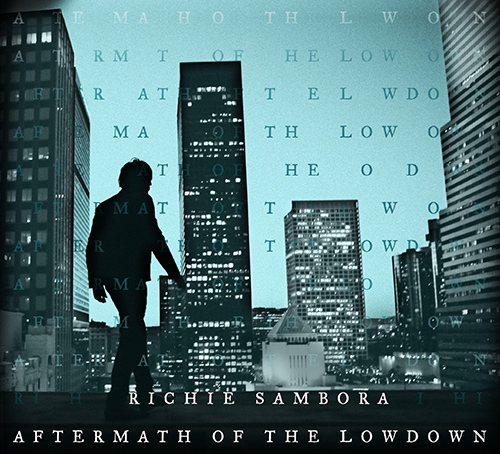re:View – Aftermath of the Lowdown, by my musical hero of a lifetime
Oh my proverbial God. The most anticipated album of the decade* is here. After some ten years of announcing and postponing, Richie Sambora has released his third solo album, Aftermath of the Lowdown.

I’ve been in a state of permanent bliss for the last two weeks, just enjoying the luxury of being able to listen to the music I’ve been waiting to hear for so many years. And trying to form an opinion in the context of having spent half my life listening to his “old stuff” – the two previous albums Stranger in this Town and Undiscovered Soul, from the early and late 1990s respectively. So this is mostly preliminary thoughts on an album I plan to become very familiar with.
Despite being the first of Richie Sambora’s albums released on an indie label, it is his most commercial sounding to date. Yet, at the same time, it’s probably his most personal.
Compared to the 1990s stuff, I would say he sings a little less about love these days, and more about life – in a voice that’s clearly less romantic and a good deal more cynical. But that’s hardly a surprise, considering all that he’s been through in the last half-decade. Thrown off track by a divorce followed closely by his father’s death, he suffered a spell of addictions and rehab while the nasty gossip headlines piled up.
It was certainly the kind of stuff that leaves a mark on a life, but also stuff that seems to have inspired a more personal songwriting than we’ve ever heard from Richie Sambora. But throughout the confessions and the regret – at their most vocal in songs such as You Can Only Get So High and Seven Years Gone – you see a man who still embraces life, who has pulled himself back to his feet and turning over a new page. Taking A Chance On The Wind, Weathering The Storm and Learning How To Fly With A Broken Wing may be somewhat soppily titled songs, but their upbeat celebration of second chances leaves you filled with a sudden happiness that’s hard to shake off.
Besides, it’s nice to see that the King of Swing has kept his charm and cheek throughout the bad times. Sugar Daddy says it all. He has also included a song for his teenage daughter Ava, which – although performed largely in the kind of thin, just-off-the-key voice that has become the trademark of all the indie kids these days (and which I don’t dig at all) – is a very sweet and touching number. The last song on the album, World, is quite a break with the style and so Beatles-y that I initially mistook it for a cover of a lesser known Beatles song. But it’s indeed an original – an easy giveaway of his musical influences. “Wearing my heroes on my sleeve,” he says.

Image via @therealsambora
Overall, my first impressions are pretty good indeed. I’m not yet ready to yell “totally amazing”, but that’s fine, because a) it’s a bit difficult to adjust to the new sound having had the two previous albums as constant companions in my life for the last 14 years and b) it’s always taken me a good few proper listens to appreciate Richie Sambora’s music to the max. (This is the point where I confess that, after listening to Stranger in this Town and Undiscovered Soul for the first time, I put them away and didn’t bother for a good year before I eventually got into them.)
So I’ll definitely have to listen to Aftermath for a few weeks before I can commit to a full opinion. But for now I’m pretty damn happy that Richie Sambora is back.
And after his gig in London this month, you’ll hear me yelling “totally amazing” for the rest of the year.
* as far as I’m concerned, anyway
